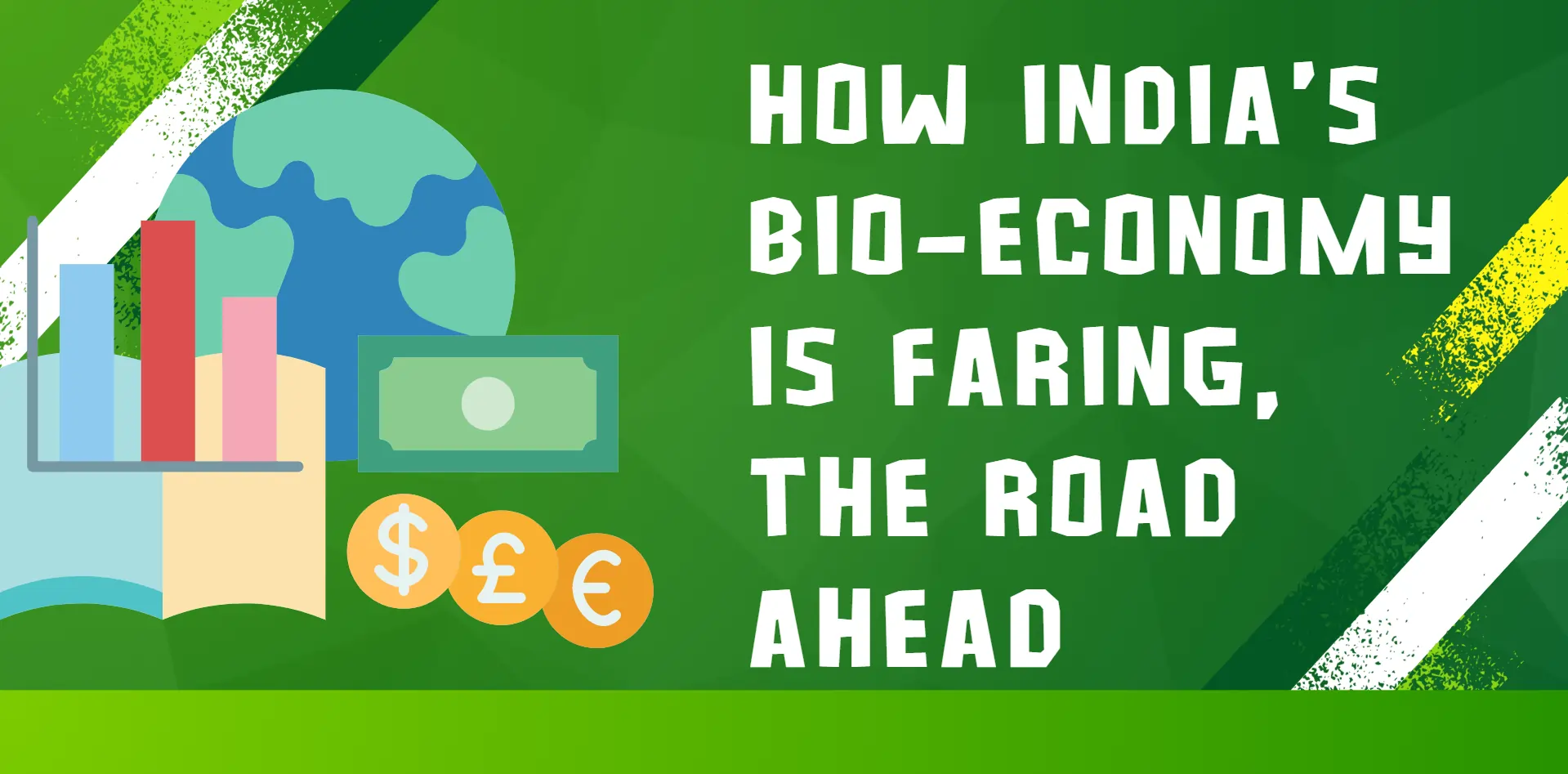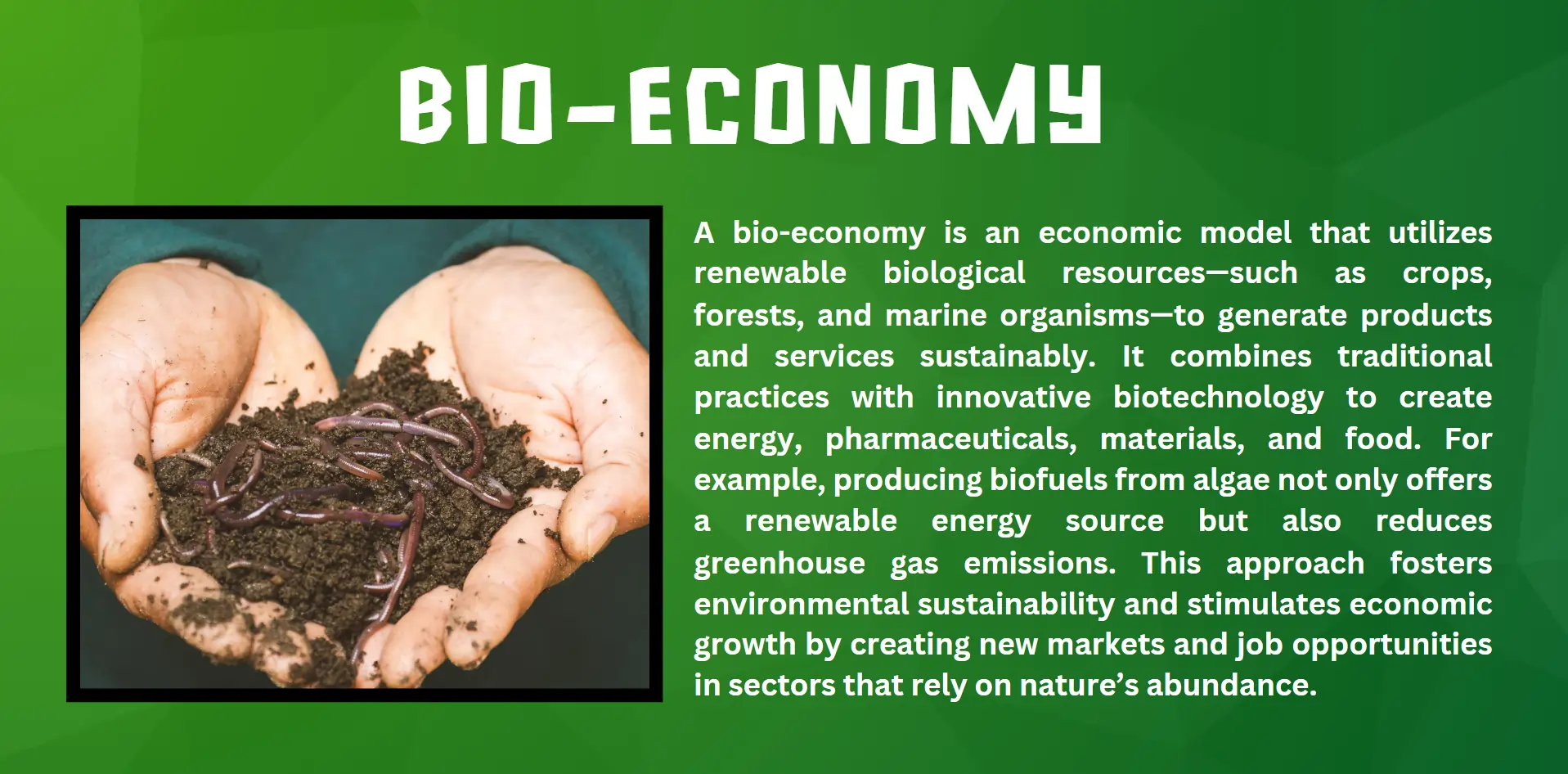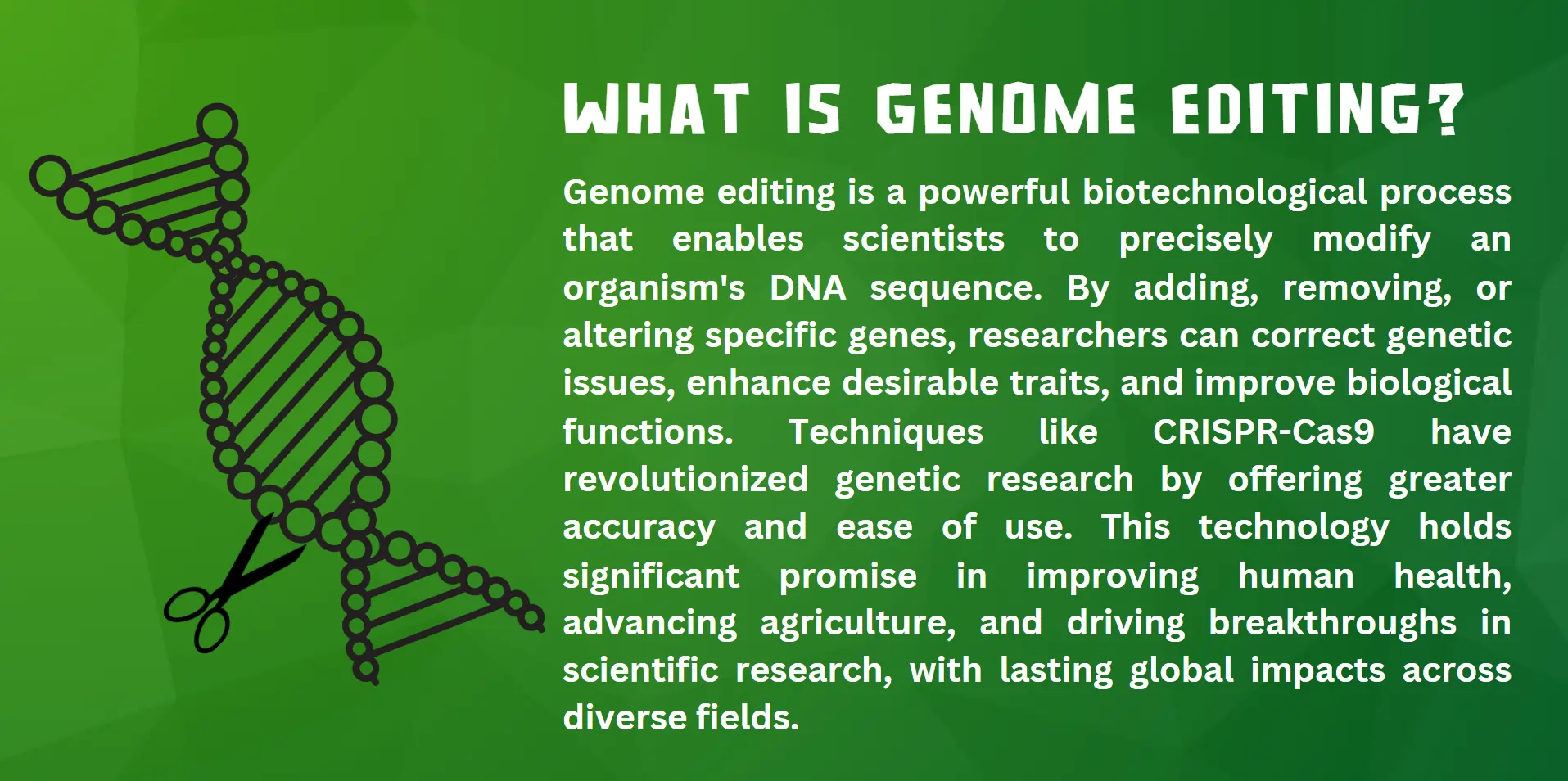The Department of Biotechnology India Bio-Economy Report predicts that this industry will expand to reach $300 billion by 2030 before reaching $1 trillion by 2047.

India’s bio-economy serves as a rich combination between time-tested natural knowledge and contemporary scientific developments. The abundant biodiversity found in India enabled the nation to depend on natural resources since ancient times for developing industries including agriculture as well as healthcare and traditional medicine systems. Modern biological technologies together with adaptable policy changes create developing opportunities to boost economic development while preserving sustainability in the present era. Despite major advancements new obstacles remain during this development process. Progress faces barriers because of insufficient infrastructure and regulatory barriers in addition to demands for improved skill competencies. An analysis of India's bio-economy performance takes place through this article while studying today's conditions and creating positive forecasts for tomorrow's bio-economy development. Read along with us to grasp India’s bio-economy strength and learn about future opportunities that lie ahead.
Understanding the Bio-economy
The bio-economy functions as a versatile system which uses biological elements together with processes as well as principles to create sustainable economic worth. The bio-economy system enables sustainable product creation through renewable natural resource utilization which includes crops from agriculture as well as forestry and marine life and microorganisms. The bio-economy introduces a circular model of operation which recycles biological materials for continuous renewal without relying on exhaustible fossil fuels and with reduced environmental consequences.
Throughout human history people have survived through natural resources as traditional knowledge and practices led their survival. Modern scientific discoveries along with biotechnological breakthroughs now transform primitive practices into a renewed system of discovery. Modern genetic research and fermentation science along with the study of enzymes have revolutionized the manufacturing process of valuable finished products from raw plants and animals. The fusion of traditional knowledge with contemporary science developments has led to breakthrough achievements consisting of eco-friendly biofuels from farm leftovers and eco-friendly plastic solutions that replace ordinary products.

The bio-economy functions on multiple academic fields in an essential way. The bio-economy unites the fields of agriculture with chemistry, biotechnology and environmental science to create a working relationship among academia industry and governmental institutions. Research focused on market requirements generates economic expansion and employment opportunities alongside global sustainable and climate-resistant progress.
People need to grasp bio-economy principles since they transform economic resource handling into an approach that combines environmental protection with financial growth. The bio-economy functions as a leading framework for sustainable resource deployment which guides countries toward futuristic economic growth through environmentally friendly operations.
The Evolution of India’s Bio-economy
The development of India’s bio-economy progressed significantly across the centuries from its foundational traditional ways toward its contemporary innovative economy. Indian communities traditionally made use of their natural land wealth utilizing passed-down farming techniques together with traditional medical practices spanning multiple generations. The core values of these ancient practices helped develop sustainable operational methods that combined knowledge of Ayurvedic remedies with biodiversity conservation and ecological management for both human well-being and environmental stability.
The Indian nation started its transition into modernity when worldwide biotechnological advancements together with sustainable resource handling systems started affecting its ancient cultural practices. Units of traditional knowledge working with modern scientific exploration now drive innovative discoveries from organic farming to bio-drug development, sustainable power production and biodegradable substance manufacturing. The biotech sector received additional impulses from government programs that combined research grants with dedicated biotech parks. Through these initiatives several institutions collaborate successfully with startups and multinational corporations to develop a diverse research and development ecosystem which encourages innovation at every level.
The Indian bio-economy has experienced an essential shift towards sustainable development along with economic growth in the recent decade. The combination of policy reforms which reduced regulations coupled with better public-private partnerships speed up the commercialization and technology translation processes. The Indian research and development apparatus has successfully tackled worldwide concerns about pollution and limited resources which established India as an essential participant for the global bio-economy of the future.
India proves its capacity for uniting traditional values with 21st-century progress as its bio-economic development advances today. The evolutionary changes reflect both India's adaptive strength and its capability to create sustainable development paths and inclusive economic expansion that will merge natural systems with technological solutions.
Strengths Driving the Bio-economy
The bio-economy of India functions because of its powerful combination between natural wealth and cultural heritage with scientific advancement and government policies. India benefits from wide natural biodiversity which functions as one of its main bio-economic forces. India possesses an extensive variety of plant and animal species which enables ample material production and maintains traditional wisdom about Ayurveda medicine and organic cultivation practices. The historical practices developed through time into contemporary scientific applications which now enable the invention of modern sustainable resource management methods alongside biotechnological developments.
The country's already established agricultural framework represents a key factor that supports its bio-economy development. Bio-based industries operate from the strong base of India’s agricultural because the country's millions of farmers work in agricultural fields. High crop yields become achievable through advanced farming techniques which unite biotechnological research at the same time with eco-friendly farming practices to develop resilient agricultural strains. The coordinated efforts between different elements create a foundation for bio-fertilizer production as well as bio-pesticide development and bioenergy solution advances which build the bio-economy framework.
The growth of this sector increases rapidly when entrepreneurial spirit comes into play. Traditional industries undergo transformation through new startups activity and research center innovation which utilizes modern technology in areas like gene editing and digital analytics along with fermentation science. The innovative approach receives support from highly trained personnel exiting prestigious research institutions and technical universities.

Protocols enacted by the government together with their established policy frameworks serve as fundamental drivers for progress. The combination of government-funded research and development activities with public-private collaborations together with simplified regulatory systems makes up an effective framework. Through their policy framework these measures smooth the process of diverse scientific innovations as they turn into commercial opportunities that generate lasting industrial development.
Multiple collaborative forces which function together as a single connected network form the basis for India to lead the future global bio-economy. The unified strategy produces both financial expansion as well as sustainable development together with increased global competitive power for moving towards a bio-based economy.
Challenges and Limitations
The biological economic sector of India holds substantial potential but encounters various limitations which prevent its complete development into a sustainable future sector. The main obstacle affecting the bio-economy sector arises from inadequate infrastructure and technological capabilities. An abundance of biological resources combined with various agricultural systems creates bottlenecks in developing high-value products because India lacks modern processing facilities together with advanced research equipment and integrated supply chains. The sector faces difficulties because of inadequate facilities which slows growth and halts the potential for expansion to capitalize on its abundant natural resources.
A dense system of policies serves to increase existing problems. The combination of central and state regulations creates bureaucratic delays and inconsistent policies between the different administrative bodies. The split regulatory system which regulates the industry produces significant delays while generating uncertainty among individuals who invest and start new businesses. Creation of regulations that fail to keep pace with fast technological progress determines how much the sector can innovate globally as well as its ability to compete internationally.
The fundamental aspect of economic hurdles significantly contributes to these factors. The bio-economy sector faces challenges because government support programs have not solved the funding shortage issue. Bio-based solution commercialization at scale is restricted because of low investment in research and an atmosphere of cautious investment decisions. Investors avoid funding bio-derived products because the markets for these products operate in a relatively fragile state in their development.
The last barrier is human capital constraints. Traditional knowledge demonstrates its worth but the biotechnology sector demands specialized personnel who can unite traditional wisdom with contemporary biotech practices. The solution and treatment of skill deficiencies stands as a critical factor to drive innovation because it enables complete utilization of traditional bio-resources for economic development.
Raising India's bio-economy into a sustainable economic force requires policymakers to work alongside research institutions and industry partners thereby building a resistant system of growth.
Emerging Trends and Innovations
Bio-economy in India experiences a fundamental transformation because emerging innovative practices continue shaping its industrial environment. Digital transformation leads the advancement of traditional bio-based industries as its most important trend. Stakeholders receive current real-time data on resource management through three key technological advancements involving artificial intelligence and big data analytics along with IoT functions. Precision farming systems analyze vital soil elements together with crop status and weather information to create better farming procedures which waste less material and deliver higher yields.
Biotechnology startups have established innovative methods to extract valuable use from the abundant biological wealth found across India. Through genomic editing innovations combined with fermentation techniques and recombinant DNA technology these inventors develop sustainable products that include bio-fertilizers along with biodegradable plastics and specialized pharmaceutical substances. The startups activity has strengthened domestic manufacturing and created opportunities for India to become a center of bio-based solution development on a global scale.
The adoption of renewable bioenergy stands as a main trend with increasing significance. The transformation of agricultural waste into high-quality biofuels along with biogas creation establishes cleaner energy options while enhancing national energy security. Through government supports and research partnerships India is able to develop innovations which solve environmental issues.
Public-private partnerships currently have a central role in speeding up the advancement process. The combination of academic institutional research efforts and industry leadership and governmental policy research allows laboratory discoveries to develop into scalable market applications. These alliances establish vital standards for regulations and guarantee sustainable technologies which demonstrate economic success.
The combination of digital tools with biotechnological innovation, renewable energy and strategic partnerships leads India towards developing a bio-economy that reduces its resilience while increasing its significant global sustainability contribution. The modern technology alliance with traditional knowledge represents a pivotal moment which establishes an inclusive sustainable bio-economic sector.
Economic, Social, and Environmental Impacts
The developing Indian bio-economy produces remarkable changes that strengthen multiple aspects between economy, society and ecology. The sector stimulates job development and draws substantial investments toward high-tech fields including renewable energy technologies along with renewable agriculture systems and biotechnology applications. The developed economic sector drives India GDP growth and generates conditions for Indian industry to compete on a global scale.
Local communities across rural areas gain empowerment through the bio-based industry rise which restores traditional knowledge alongside establishing educational and employment opportunities in the community. Modern technology that collaborates with traditional practices streamlines opportunities to unite urban people with rural communities while fostering comprehensive development progress.
The bio-economy establishes pathways which lead to sustainable environmental development. The Indian nation achieves environmental sustainability by focusing on renewable resource usage and green production standards and waste management practices. The multiple economic social and environmental advantages demonstrate the powerful potential which a strong bio-economy has to achieve sustainable development and increase resilience before upcoming challenges.
The Road Ahead
To achieve its bio-economic potential India requires systematic strategic actions toward its future development. First, modernizing infrastructure is crucial. The modification of biological research labs and supply systems and processing units will make the transformation from biological raw materials into valuable products more efficient. The development of bio-economy requires regulatory reforms which simplify procedures together with bureaucratic delay reduction to ensure alignment of policies with rapid technological advancements that support innovation.
Raising the quality of human resources stands as equally essential compared to alternative strategies. Educational institutions along with vocational programs need to teach both conventional knowledge systems with the latest advances in biotechnology for building a workforce with multidimensional abilities. Talent development investments through funding will enable advanced technique deliveries and sustainable solution research opportunities. Public-private partnerships need nurturing because this will create a bridge between academic discoveries and market success in commercial applications.
Sustainability needs to lead the evolution process continuously. Economic expansion becomes possible through implementing environmentally friendly practices together with renewable energy systems and circular economy frameworks while reducing environmental disruptions. Finally global partnerships with international institutions will bring advanced bio-economic practices and create new export markets which will establish India as the global leader in this field.
Conclusion
The bio-economy of India stands strategically poised for transformation through the union between native customs and advanced industrial advancement. The sector's power stems from India's diverse natural biodiversity together with its established agricultural background along with rising technological capabilities. Our path toward progress remains on-going because we continue to face barriers in infrastructure development as well as weaknesses in regulatory standards and workforce qualification standards. A strategic cooperation between different organizations will function as the essential foundation for future development. Bio-based industries need modernized facilities and optimal policies combined with extensive educational investments to become their highest potential. Public-private alliances together with multinational partnerships will take this transformation forward to maximize research progress which results in concrete market achievements.